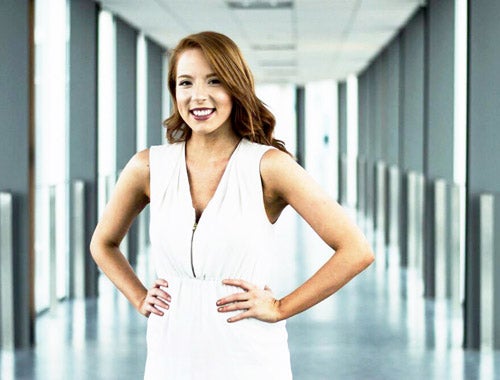
Startup founder graduates with dreams of building more ventures
She didn't fit the tech founder stereotype, but Rachel Friesen says she thrived during her two years leading an enterprise at Waterloo

She didn't fit the tech founder stereotype, but Rachel Friesen says she thrived during her two years leading an enterprise at Waterloo
By Rachel Friesen Faculty of Environment
I’ve had the privilege of being surrounded by talented and hard-working individuals during my undergrad at Waterloo. Every single friend, mentor and influencer catalyzed my growth and should take partial credit for everything I accomplished in my undergrad: I’m graduating this fall as a result of their impact on my life.
During my time at Waterloo, I took every opportunity, from running the International Development Conference to being my student council’s VP, to starting and running my own company, EyeCheck, under the Velocity program.
When I came on as a founder for EyeCheck in my third year, I didn’t fit the mold of a typical tech startup founder - in fact I had never written a line of code in my life. But not “fitting the mold,” was the best thing for me, as it allowed me to lean in to my business, operations and marketing strengths.
There is no one more hard working than the individuals working in startups and I had the privilege of having those people as my peers and friends and learning from them over the last two years. They motivated me to think like an “engineer” and to work more efficiently than I thought possible.
Throughout my time leading EyeCheck, I learned that you have to fundamentally believe in your company and its success in a way that goes beyond passion – because building a startup is not the glamorous life that people imagine.
EyeCheck made me realize that my time is limited and valuable. There are so many distractions in the startup world and it’s important to focus on your company’s objectives and only allow time for things that allow you to meet your company’s goals. Running your own company is a labour of love. It’s a lot of late nights, over-drafted bank accounts and time spent away from friends and family. And still your company may not make it. Unfortunately, due to a variety of factors we ultimately decided to wind down EyeCheck.
Although the company didn’t ultimately “take-off,” I choose to not look at is as a failure but instead as one of my greatest achievements. I grew more in two years than I thought possible. I came out of the experience a more focused, hardworking and visionary individual than before.
Prior to EyeCheck I’d always imagined what it would be like to be an entrepreneur – because I was a Waterloo student, I now know what it is like to live out that reality. As cheesy as it sounds, my time as a student at Waterloo literally allowed me to make my dreams a reality.
Which is why I can gratefully say I am leaving Waterloo with far more than I degree. I’m leaving with the belief in myself to create my dream career going forward and I’ve been equipped with the skills to execute that dream.
Within ten years I want to start my own social enterprise again. My passion is at the intersection of people and profit. I want to see sustainable social impact happen through the businesses that I will create.
For now, I’ve landed myself at another amazing startup called Georgette Packaging in Velocity. We make branded boxes, cups and bags for ambitious businesses. I’m in love with the work I’m doing here (operations and marketing) and I am working with the most amazing people.

Read more
Here are the people and events behind some of this year’s most compelling Waterloo stories

Read more
GreenHouse awards $10,000 to student ventures and changemakers aiming to transform livelihoods within disadvantaged communities

Read more
Meet the five exceptional graduate students taking the convocation stage as Class of 2024 valedictorians
The University of Waterloo acknowledges that much of our work takes place on the traditional territory of the Neutral, Anishinaabeg, and Haudenosaunee peoples. Our main campus is situated on the Haldimand Tract, the land granted to the Six Nations that includes six miles on each side of the Grand River. Our active work toward reconciliation takes place across our campuses through research, learning, teaching, and community building, and is co-ordinated within the Office of Indigenous Relations.